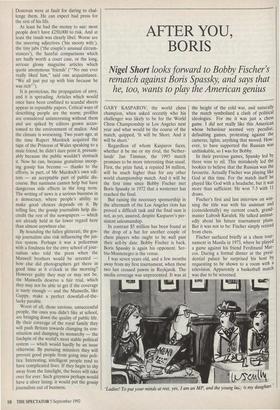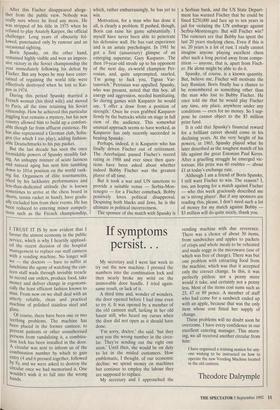AFTER YOU, BORIS
Nigel Short looks forward to Bobby Fischer's
rematch against Boris Spassky, and says that he, too, wants to play the American genius
GARY KASPAROV, the world chess champion, when asked recently who his challenger was likely to be for the World Chess Championship in Los Angeles next year and what would be the course of the match, quipped, 'It will be Short. And it will be short.'
Regardless of whom Kasparov faces, whether it be me or my rival, the Nether- lands' Jan Timman, the 1993 match promises to be more interesting than usual. First, the prize fund, a reputed $4 million, will be much higher than for any other world championship match. And it will be the first time since Bobby Fischer met Boris Spassky in 1972 that a westerner has reached the final.
But raising the necessary sponsorship in the aftermath of the Los Angeles riots has proved a difficult task and the final sum is not, as yet, assured, despite Kasparov's per- sistent salesmanship.
In contrast $5 million has been found at the drop of a hat for another couple of chess players who ought to be well past their sell-by date. Bobby Fischer is back. Boris Spassky is again his opponent. Ser- bia-Montenegro is the venue.
I was seven years old, and a few months away from my first tournament, when these two last crossed pawns in Reykjavik. The media coverage was unprecented. It was at the height of the cold war, and naturally the match symbolised a clash of political ideologies. For me it was just a chess game. I did not really like this American whose behaviour seemed very peculiar, defaulting games, protesting against the cameras, lights, anything that moved. How- ever, to have supported the Russian was unthinkable, so I was for Bobby.
In their previous games, Spassky led by three wins to nil. This mistakenly led the bookies to believe that the Russian was the favourite. Actually Fischer was playing like God at this time. For the match itself he played like God with a headache, but it was more than sufficient. He won 7-3 with 11 draws.
Fischer's first and last interview on win- ning the title was with his assistant and (coincidentally) my current coach, grand- master Lubosh Kavalek. He talked animat- edly about his future tournament plans. But it was not to be: Fischer simply retired from chess.
Fischer surfaced briefly at a chess tour- nament in Manila in 1973, where he played a game against his friend Ferdinand Mar- cos. During a formal dinner at the presi- dential palace he surprised his host by requesting to be shown to a room with a television. Apparently a basketball match was due to he screened.
'Ladies! To put your minds at rest, yes, 1 am an MP, and the young 1aa_ is my daughter. After this Fischer disappeared altoge- ther from the public view. Nobody was really sure where he lived any more. He was stripped of his title in 1975 when he refused to play Anatoly Karpov, the official challenger. Long years of obscurity fol- lowed, punctuated only by rumour and an occasional sighting.
Boris Spassky, on the other hand, remained highly visible and won an impres- sive victory in the Soviet championship the year immediately following his defeat by Fischer. But any hopes he may have enter- tained of regaining the world title were effectively destroyed when he lost to Kar- pov in 1974.
During this period Spassky married a French woman (his third wife) and moved to Paris, all the time retaining his Soviet citizenship. How he achieved this particular Juggling feat remains a mystery, but his new country allowed him to build up a comfort- able though far from affluent existence. He has also represented a German club, Solin- gen (for which I too play), adding fashion- able Deutschmarks to his pay packet.
But the last decade has seen the once formidable powers of Spassky steadily fad- ing. An unhappy mixture of acute laziness and natural aging has sent him tumbling down to 101st position on the world rank- ing list. Organisers of elite tournaments, Irked by his lacklustre performances and less-than-dedicated attitude (he is known sometimes to arrive at the chess board in shorts, tennis racket in hand), have gradu- ally excluded him from their events. He has been reduced to entering minor competi- tions such as the French championship,
which, rather embarrassingly, he has yet to win.
Motivation, for a man who has done it all, is clearly a problem. If pushed, though, Boris can raise his game substantially. I myself have never been able to penetrate his defensive wall. He has vast experience and is an astute psychologist. In 1981 he got a first (unsavoury) glimpse of an emerging superstar, Gary Kasparov. The then 19-year-old strode up to his opponent of the next day, ex-world champion Pet- rosian, and, quite unprompted, snarled, `I'm going to fuck you, Tigran Var- tanovich.' Petrosian was appalled. Spassky, who was present, noted that this boy, all energy and aggression, needed humiliating. So during games with Kasparov he would say, 'I offer a draw from a position of strength.' Once he even grabbed Kasparov firmly by the buttocks whilst on stage in full view of the audience. This somewhat unusual approach seems to have worked, as Kasparov has only recently succeeded in beating Spassky.
Perhaps, indeed, it is Kasparov who has finally driven Fischer out of retirement. The Azerbaijani passed Fischer's record rating in 1988 and ever since then ques- tions have been asked about whether indeed Bobby Fischer was the greatest player of all time.
But it took a war and UN sanctions to provide a suitable venue — Serbia-Mon- tenegro — for a Fischer comeback. Bobby positively loves political disapproval. Despising both blacks and Jews, he is the ultimate in political incorrectness.
The sponsor of the match with Spassky is a Serbian bank, and the US State Depart- ment has warned Fischer that he could be fined $250,000 and face up to ten years in jail for violating the UN embargo against Serbia-Montenegro. But will Fischer win? The rumours are that Bobby has spent the last 20 years studying chess. Even if this is so, 20 years is a lot of rust. I really cannot imagine anyone playing excellent chess after such a long period away from compe- tition -- anyone, that is, apart from Fisch- er. He alone might be able to do it.
Spassky, of course, is a known quantity. But, believe me, Fischer will motivate the lazy Russian. Boris finally has a chance to be remembered as something other than the man who lost to Bobby Fischer. He once told me that he would play Fischer any time, any place, anywhere under any conditions — even for no money. So I sup- pose he cannot object to the $5 million prize fund.
It is odd that Spassky's financial reward for a brilliant career should come in his declining years. At the very height of his powers, in 1965, Spassky played what he later described as the toughest match of his life against the great Estonian Paul Keres. After a gruelling struggle he emerged vic- torious. His prize was 60 roubles — about at today's exchange rate.
Although I am a friend of Boris Spassky, I still want Fischer to win. The reason? I, too, am hoping for a match against Fischer — who this week graciously described me as 'a strong player'. But if any sponsors are reading this, please, I don't need such a lot of money for my match against Bobby $3 million will do quite nicely, thank you.



















































 Previous page
Previous page